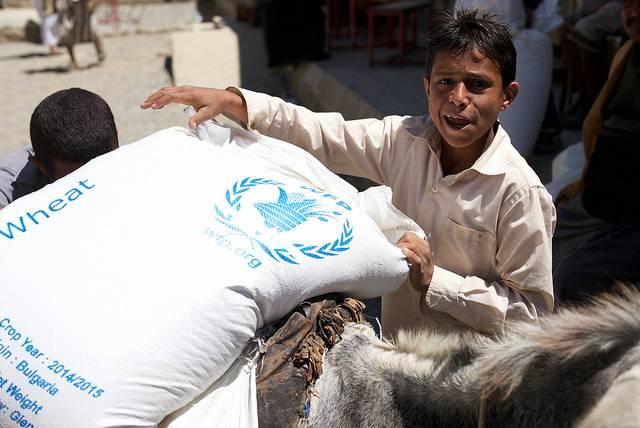
The United Nations and its partners are seeking funds to mitigate the hunger and malnutrition in Yemen amidst one of the worst humanitarian crises in the world.
The U.N. World Food Program, the largest hunger-fighting agency in the world, reports that nearly 14.4 million people in Yemen are now food insecure. Of that number, more than 7 million people -- or about 1 in every 5 -- are in desperate need of food assistance.
The U.N. is trying to answer the call by issuing an appeal north of $2 billion -- which, if fulfilled, would mark the largest humanitarian contribution to Yemen. The U.N. has persistently warned that ignoring the crisis in Yemen could lead to famine and further exacerbate starvation and lack of resources.
The humanitarian appeal looks to provide 12 million Yemeni people with life-saving assistance this year.
Yemen’s rank as one of the poorest Arab countries has been exacerbated by civil war and strategic blockades limiting resources. The conflict erupted full-steam in March 2015 when Abdrabbuh Mansour Hadi was uprooted from his presidential palace by Houthi rebels.
The tensions began in 2011, when a political uprising forced Ali Abdullah Saleh, the country’s longtime authoritarian leader, to transfer power to Hadi. The Houthis, a Zaidi Shia-led group that formerly called for the resignation of Saleh, joined teams with the former president and is now using his military influence to fight Hadi and his expelled government.
The conflict, now nearing its second anniversary, has no end in sight. Al-Qaeda in the Arabian Peninsula (AQAP) maintains strong footing in the region and is considered one of the most dangerous branches of al-Qaeda because of its global reach and militaristic expertise, the BBC reports.
The U.N. estimates that 10.3 million people are acutely affected and need some form of humanitarian assistance in the vein of food, health and medical services, clean water and sanitation, and security. It remains challenging to deliver humanitarian aid to the war-torn country, as shipping ports are tightly monitored and airstrikes often threaten the security of agencies looking to donate resources to those in need.
The 2017 initiative, called the Yemen Humanitarian Response Plan, would target those facing acute needs or those likely to slip into what the U.N. calls “acute-need status.”
Although this appeal represents the largest requested sum to Yemen for international assistance, the international community provided a number of services to the country last year. In 2016, the U.N. reported that 120 partners worked in major Yemeni hubs to assist more than 5.6 million people with direct humanitarian aid.
The 2017 aim looks to nearly double that number. As the war intensifies and the food remains sparse, humanitarian aid in Yemen is more vital than ever.
“Two years of war have devastated Yemen, and millions of children, women and men desperately need our help,” said Stephen O’Brien, under-secretary-general for humanitarian affairs and emergency relief coordinator, in a UN news release. “Humanitarian partners are ready to respond, but they need timely, unimpeded access and adequate resources to meet the humanitarian needs wherever they arise.”
Image credit: Flickr/Julien Harneis
Based in Atlanta, GA, Grant is a nonprofit professional and freelance writer passionate about affordable housing and finding sustainable approaches to international development. A proud graduate of the University of Maryland, Grant spent four months post-grad living in Armenia where he worked for Habitat for Humanity and the World Food Programme. He enjoys playing trivia with friends but is still seeking his first victory - he ceaselessly blames his friends lack of preparation.














